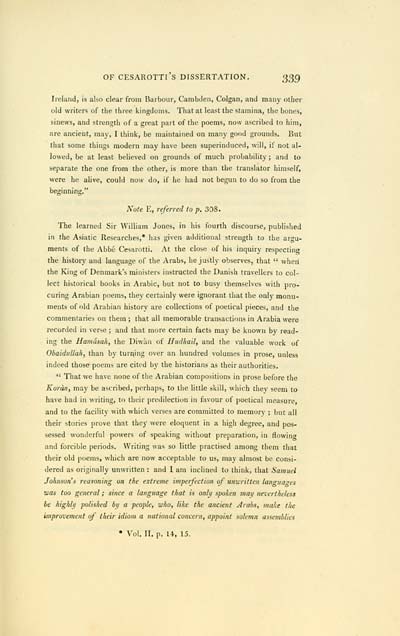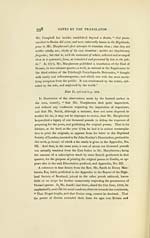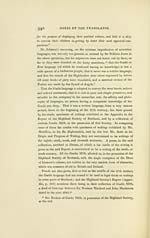J. F. Campbell Collection > Poems of Ossian > Volume 3
(351)
Download files
Complete book:
Individual page:
Thumbnail gallery: Grid view | List view

OF CESAROTTl's DISSERTATION. ^^g
Irelaiid, is also clear from Barboiir, Cambden, Coigan, and tnany other
old writers of the three kingdoms. That at least the stamina, the bones,
sinews, and strength of a great part of the poems, now ascribed to him,
are ancient, m.iy, I think, be maintained on many gond grounds. But
that sorae things modern may have been superinduced, will, if not al-
lowed, be at least believed on grounds of much probability ; and to
separate the one from the other, is more than the translator himself,
were he alive, could now do, if he had not begun to do so from the
beginning."
Note E, referred to p. 308.
The learncd Sir William Jones, in his fourth discourse, published
in the Asiatic Researches,* has given additional strength to the argu-
ments of the Abbe Cesarotti. At the close of his inquiry respecting
the history and language of the Arabs, he justly observes, that " when
the King of Denmark's rainistcrs instructed the Danish travellcrs to col-
lect historical books in Arabic, but not to busy themselves wilh pro-
curing Arabian poeras, they certainly were ignorant tliat the onl^- monu-
ments of old Arabian history are coUections of poetical pieces, and the
coramentaries on them ; that all meraorable transactions in Arabia were
recorded in verse ; and that more ccrtain facts may be kiiown by read-
ing the Hamàsah, ihe Diwàn of Hudhail, and the valuable work of
Obaidiillah, than by turning over an hundred voluraes in prose, unless
indeed those poems are citcd by the historians as their authorities.
" That \ve have none of the Arabìan compositions in prose before the
Koràn, may be ascribed, porhaps, to the little skill, which they seem to
have had in writing, to their prcdilection in favour of poetical measure,
and to the facility with which verses are committed to memory ; but all
their stories prove that thcy were eloquent in a high degree, and pos-
sessed wonderful powers of speaking without preparation, in flowin"
and forcible periods. Writing was so little practised among them that
their old poeras, which are now acceptable to us, may almost be consi-
dcred as originally unwritten : and I am inclined to ihink, that Samuel
Johnsun's reasoning on the ertreme imperf'ection qf wmritten languages
was too general ; since a language that is only spoken tnai/ neierthclcss
be highli/ polished by a people, who, like the ancienf Arabs, make the
improvement of their idiom a nutional concern, appoint solemn assemblics
• Vol. II, p. U, 15.
Irelaiid, is also clear from Barboiir, Cambden, Coigan, and tnany other
old writers of the three kingdoms. That at least the stamina, the bones,
sinews, and strength of a great part of the poems, now ascribed to him,
are ancient, m.iy, I think, be maintained on many gond grounds. But
that sorae things modern may have been superinduced, will, if not al-
lowed, be at least believed on grounds of much probability ; and to
separate the one from the other, is more than the translator himself,
were he alive, could now do, if he had not begun to do so from the
beginning."
Note E, referred to p. 308.
The learncd Sir William Jones, in his fourth discourse, published
in the Asiatic Researches,* has given additional strength to the argu-
ments of the Abbe Cesarotti. At the close of his inquiry respecting
the history and language of the Arabs, he justly observes, that " when
the King of Denmark's rainistcrs instructed the Danish travellcrs to col-
lect historical books in Arabic, but not to busy themselves wilh pro-
curing Arabian poeras, they certainly were ignorant tliat the onl^- monu-
ments of old Arabian history are coUections of poetical pieces, and the
coramentaries on them ; that all meraorable transactions in Arabia were
recorded in verse ; and that more ccrtain facts may be kiiown by read-
ing the Hamàsah, ihe Diwàn of Hudhail, and the valuable work of
Obaidiillah, than by turning over an hundred voluraes in prose, unless
indeed those poems are citcd by the historians as their authorities.
" That \ve have none of the Arabìan compositions in prose before the
Koràn, may be ascribed, porhaps, to the little skill, which they seem to
have had in writing, to their prcdilection in favour of poetical measure,
and to the facility with which verses are committed to memory ; but all
their stories prove that thcy were eloquent in a high degree, and pos-
sessed wonderful powers of speaking without preparation, in flowin"
and forcible periods. Writing was so little practised among them that
their old poeras, which are now acceptable to us, may almost be consi-
dcred as originally unwritten : and I am inclined to ihink, that Samuel
Johnsun's reasoning on the ertreme imperf'ection qf wmritten languages
was too general ; since a language that is only spoken tnai/ neierthclcss
be highli/ polished by a people, who, like the ancienf Arabs, make the
improvement of their idiom a nutional concern, appoint solemn assemblics
• Vol. II, p. U, 15.
Set display mode to: Large image | Transcription
Images and transcriptions on this page, including medium image downloads, may be used under the Creative Commons Attribution 4.0 International Licence unless otherwise stated. ![]()
| Early Gaelic Book Collections > J. F. Campbell Collection > Poems of Ossian > Volume 3 > (351) |
|---|
| Permanent URL | https://digital.nls.uk/81285964 |
|---|
| Description | Vol. III. |
|---|---|
| Shelfmark | Cam.1.b.5 |
| Additional NLS resources: | |
| Attribution and copyright: |
|
| Description | Volumes from a collection of 610 books rich in Highland folklore, Ossianic literature and other Celtic subjects. Many of the books annotated by John Francis Campbell of Islay, who assembled the collection. |
|---|
| Description | Selected items from five 'Special and Named Printed Collections'. Includes books in Gaelic and other Celtic languages, works about the Gaels, their languages, literature, culture and history. |
|---|

